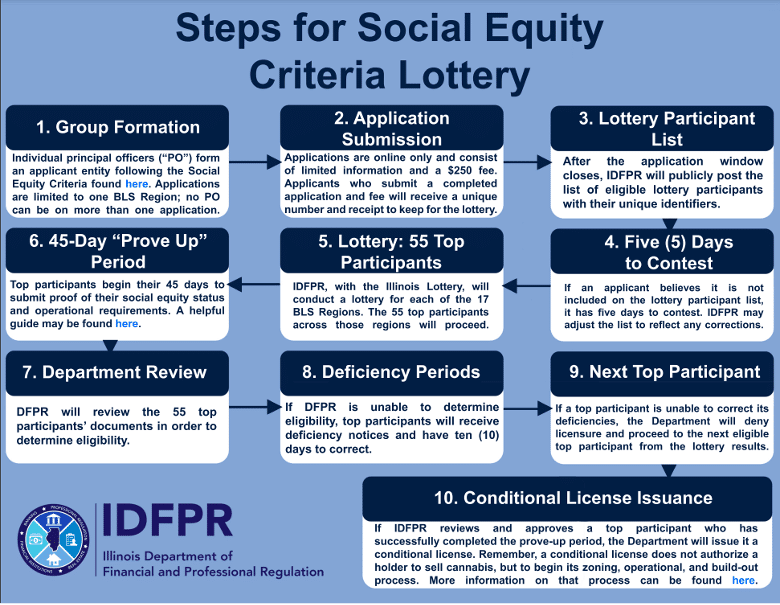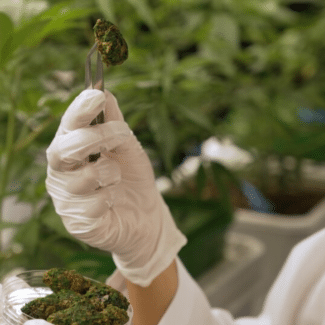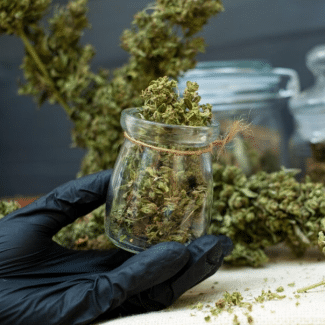
How to Open a Dispensary in Illinois – 2024 Guide
Discover the essential steps and insights on how to successfully open a dispensary in Illinois. This comprehensive guide covers the intricate licensing process, regulatory requirements, and key considerations for entrepreneurs looking to enter the burgeoning cannabis market in the state.
Ready to enter the green rush in Illinois?
With the legalization of recreational marijuana in Illinois, it’s only fair for entrepreneurs to consider running a dispensary. However, operating a dispensary involves addressing particular licensing matters in addition to the legal challenges of any business.
As you embark on this journey to open your dispensary, handling all the regulations and considering general business principles is crucial. We are here to break it down for you.
Here is a step-by-step guide to opening a dispensary in Illinois, from obtaining a license to establishing your store. So, let’s get started on this journey together!
Overview of Cannabis in Illinois
Illinois is considered one of the most promising states for cannabis businesses, offering substantial prospects for entrepreneurs, as per various studies. The market has experienced significant growth since legalizing cannabis for medical and recreational use.
On June 25, 2019, Illinois became the 11th state to legalize recreational marijuana. And, as of January 1, 2020, recreational consumption, possession, and sales of cannabis products are legal in the state. With the legalization of cannabis consumption lounges and the issuance of additional dispensary licenses, the cannabis industry in Illinois continues to grow.
In July 2024, the state celebrated $1 billion in cannabis retail sales, which includes more than $850 million in adult-use cannabis sales and almost $150 million in medical cannabis sales. This milestone was achieved two weeks faster in 2024 compared to 2023. This fiscal year also saw total cannabis sales surpass $2 billion.
The Illinois Department of Commerce and Economic Opportunity (DCEO) has been regularly granting dispensary licenses. They also established the Cannabis Social Equity Program under the Cannabis Regulation and Tax Act (CRTA). The program aims to provide opportunities for people and communities who have been historically impacted by cannabis-related arrests and imprisonment to participate in the legal cannabis industry. As of July 2024, 218 dispensaries have been licensed by the Illinois Department of Financial and Professional Regulation (IDFPR).
Additionally, under the CRTA, the “Restore, Reinvest, Renew” (R3) program allocates 25% of all cannabis tax revenue to support communities affected by economic disinvestment, violence, and the disproportionate impact of the war on drugs.
Current State of the Cannabis Market in Illinois
The Cannabis Regulation and Tax Act, effective January 1, 2020, legalized recreational marijuana in Illinois. Since then, the market for cannabis products has been expanding steadily.
In the first month of legalization, Illinois recorded recreational cannabis sales worth nearly $39.3 million, excluding state government taxes. This number increased each month, resulting in total sales of $668.8 million by the end of the year.
The sales figures for recreational marijuana in 2021 more than doubled those of 2020, amounting to approximately $1.38 billion in total sales. Additionally, over 30 million items were sold in 2021, almost 110% higher than 2020’s 14.49 million.
Although 2022’s growth rate was slower than 2021, the Illinois market remained active, with a 12% increase in sales compared to 2021. In 2022, the state sold 36.43 million items, generating approximately $1.55 billion in sales.
December was the most popular month for adult-use cannabis product sales in Illinois. From 2020 to 2023, each year’s final month witnessed the highest number of items sold and the most significant sales total. These figures peaked in December 2023, with sales amounting to $153.9 million.
When it comes to specific cannabis products, a 2023 industry report on the Illinois cannabis market revealed Pre-rolls as an area of opportunity in the state. Pre-rolls, which has been one of the fastest-growing categories in cannabis, have seen a 5.6% increase in sales in 2022.
Cannabis Social Equity Programs
Equity in social policy means treating everyone equally, fairly, and with justice. It considers systemic inequalities to ensure that every community member has access to the same opportunities and outcomes.
Any form of equity recognizes the existence of inequalities and strives to eliminate them. The Marijuana Regulation and Taxation Act enacted in New York State is considered the most progressive cannabis legalization bill in the nation.
In Illinois, a social equity program is in place to promote diversity and inclusion within the cannabis industry. This program is designed to provide opportunities for individuals and communities impacted by the war on drugs to enter and succeed in the legal cannabis market.
Additionally, the DCEO has introduced the “Social Equity Cannabis Loan Program” to financially support those who qualify for social equity.
As part of the Social Equity Program, the DCEO aims to facilitate opportunities for individuals and communities historically affected by cannabis-related detentions and arrests to work in the legal marijuana sector.
Types of Dispensary Licenses in Illinois
In Illinois, several types of dispensary licenses are available for businesses interested in operating a legal cannabis dispensary. The licenses are issued by the Illinois Department of Financial and Professional Regulation (IDFPR) and are divided into medical and adult use.
In Illinois, it is permitted to grow, process, and market cannabis for medical and recreational purposes. However, the state has a multifaceted regulatory framework and licensing system for companies operating in the cannabis industry.
All cannabis businesses involved in the supply chain, including cultivators and dispensaries, must obtain a license and are subject to continuous regulatory supervision and enforcement.
Conditional Adult-Use Dispensary License
The Conditional Adult-Use Dispensary License is available in Illinois for businesses interested in operating a legal adult-use cannabis dispensary. It is a provisional license that allows the holder to begin operating a dispensary while completing the licensing process.
The application process is similar to the standard adult-use dispensary license, and if approved, the holder can operate for 180 days while completing the final requirements. The conditional license will expire unless those requirements are met within the period.
Other Cannabis Business License Types in Illinois
In addition to dispensary licenses, several other types of licenses are available in the legal cannabis industry in Illinois. These include:
These licenses are processed and administered by the Illinois Division of Cannabis Regulation. Each type has its own set of requirements and regulations that must be followed to maintain compliance with Illinois state law. The application process for these licenses is also highly competitive due to the limited number of licenses available.
Your Cannabis Business Deserves the Best
Application Process for a Dispensary License in Illinois
When planning to open a dispensary in Illinois, you must know how to apply and how much it takes. Interested applicants must complete an extensive application process through the Illinois Department of Financial & Professional Regulation (IDFPR) to apply for a dispensary license in Illinois.
Medical Dispensary License
As of October 2023, the IDFPR is not accepting applications for new licensed medical cannabis dispensary sites. Regularly check the website for updates on when applications will be accepted again. You can also check out this document from the Illinois government website to learn more about the application process.
Meanwhile, here is an overview of the application process and requirements for getting a medical cannabis dispensary license in Illinois.
Fees
There is a $5,000 non-refundable application fee. This fee shall be provided in a sealed envelope labeled “application fee” along with the submission checklist and must only be hand-delivered in the form of a certified check or money order.
Required Documentation
- Submission Checklist
- Application Form
- Suitability of Proposed Dispensary
- Business and Operations Plan
- Security Plan
- Recordkeeping and Inventory Plan
- Financial Disclosures
- Bonus Section (optional)
- Labor and Employment Practice
- Research Plan
- Community Benefits Plan
- Local Community/Neighborhood Report
- Environmental Plan
- Verification of Minority-, Female-, Veteran-, or Disabled Person Owned
- Illinois Based Applicants
Adult Use Dispensing Organization (AUDO) License
The AUDO license is granted upon completion of the full application process, replacing the Conditional Adult-Use Dispensary License.
The process for obtaining this license in Illinois is more complex compared to other states.
As of March 2024, the IDFPR uses the Social Equity Criteria, a new application and lottery process designed to grant social equity licenses (Conditional Licenses) to 55 applicants. This process is purely done online via the IDFPR Online Service Portal. Below is the overview of the lottery application:
To learn more about the lottery process and how to meet each specific criterion, check out the IDFPR’s Social Equity Criteria Data Point Primer.
Required Documentation
The criteria for those qualified to participate in the lottery are divided into Criteria A and B with both having further classifications.
Criteria A
- (i) – An individual who has resided for at least 5 of the preceding 10 years in a census tract that has a poverty rate of at least 20% according to the latest 5-year American Community Survey
- (ii) – An individual who has resided for at least 5 of the preceding 10 years in a census tract where at least 20% of the households receive assistance under the Supplemental Nutrition Assistance Program in the latest 5-year American Community Survey
- (iii) – An individual who has resided for at least 5 of the preceding 10 years in a census tract area classified as “low income and low access” where at least 100 households are more than onehalf mile from the nearest supermarket and have no access to a vehicle or a significant number of the population is greater than 1 mile from the nearest supermarket, supercenter, or large grocery store for an urban area or greater than 20 miles for a rural area, as classified by the latest United States Department of Agriculture Economic Research Service’s Food Access Research Atlas.
- (iv) – An individual who has received Medicaid, Supplemental Security Income, Social Security Disability, and/or subsidized housing for at least 5 of the preceding 10 years.
- (v) – An individual who has resided for at least 5 of the preceding 10 years in a census tract in the top 15th percentile for the percent of residents in the census tract failing to graduate from High School in that state, as classified by the latest 5-year American Community Survey
Criteria B
- (i) – An individual who has been arrested for, convicted of, or adjudicated delinquent for any offense, or substantially similar offense, of Illinois, federal or other state law for possession of not more than 500 grams of cannabis; or manufacture, delivery, or possession with intent to deliver cannabis up to 30 grams
- (ii) – An individual who has a family member who has been arrested for, convicted of, or adjudicated delinquent for any offense, or substantially similar offense, of Illinois, federal, or other state law for the offenses stated above in Criteria B (i).
- (iii) – An individual who has been a victim of firearm injury. This must be evidenced by either a police report or medical record.
For a full list of documents per criterion, please refer to the Social Equity Criteria Data Point Primer.
Next Steps for Conditional Licensees
After being selected in the lottery for a conditional license, you cannot immediately start selling cannabis products. You must first obtain an Adult Use Dispensing Organization License (AUDO). The following steps outline the process for Conditional Licensees to acquire the full Adult Use Licensure.
| Step 1 |
| Identification of Physical Address |
| Step 2 |
| Confirmation of Operation Within BLS Region |
| Step 3 |
| Application for Principal Officers- Exhibit A |
| Step 4 |
| Notice of Proper Zoning Form and Documentation – Exhibit B |
| Step 5 |
| Submission of Floor Plan – Exhibit C |
| Step 6 |
| Surety Bond or Escrow Account – Exhibit D |
| Step 7 |
| Completion of Adult Use License Application |
| Step 8 |
| Completion of Self-Inspection Form |
| Step 9 |
| Scheduling of Final Inspection |
| Step 10 |
| Submit Payment |
| Step 11 |
| 365 Days to Identify a Location |
Understanding the Dispensary License Application Process
Timelines for Obtaining a License
Completing each aspect of the application process in full and submitting it is mandatory to have the application reviewed. Generally, the entire process takes around three months to conclude after submission. It is crucial to meet all deadlines throughout the process, as the IDFPR only entertains applications that meet deadlines.
Financing and Business Plan for a Dispensary
The crucial step in getting a cannabis dispensary license is to develop a business plan, which will be used to secure the necessary financial resources. A solid business plan is one of the most essential tools in an entrepreneur’s toolkit. In general, your cannabis business plan should include the following:
- The physical location of your dispensary
- Funding plan, or the source of your startup and ongoing capital
- Sourcing plan for procuring cannabis products
- Revenue projections
- Estimate or actual number of employees
- Diversity and equity plans
- Marketing plan
- Safety and security plan
- Technology plan
- The insurance company you will be opting for
- Other relevant information you want to document
A well-crafted business plan is essential for the success of your business. It contains all the necessary information to present to potential investors and lenders, outlining the steps you will take to start and expand your business. Agencies like the Small Business Administration (SBA) can help you find funding sources from private companies or banks if you need help getting it.
Overall, while developing your business plan, ensure that you follow Illinois dispensary laws and do not include anything that goes against the rules and regulations.
Types of Financing Available
There are many financing options available to you. The best approach is to identify the funding sources that are most appropriate for your business and its objectives. The following is an overview of the different financing options and their uses.
- Debt financing is a financial strategy in which borrowed funds are utilized as a business investment and are repaid with interest over a set period.
- Equity financing, on the other hand, involves selling shares of stock in a company, or a specific percentage of it, to investors in exchange for capital. This approach grants investors ownership stakes in the business, entitling them to share profits and losses.
- Venture capital is a type of equity financing wherein investors fund start-ups expecting to earn substantial returns on their investment down the line. Businesses with high-growth potential typically choose this option but may still need to prove financial success.
- Commercial loans allow you to borrow money from commercial banks. They can be used for almost anything related to opening a dispensary: equipment purchases, inventory purchases, real estate leasing, etc.
- Personal loans are also an option if you need funds quickly but don’t want to take out a commercial loan because of high-interest rates or lousy credit history requirements.
Risk Management Plan
Opening a dispensary in Illinois has some risks that should be considered. A well-developed risk management plan can help mitigate these risks and ensure the dispensary succeeds. Here are some key elements that should be included in a risk management plan for opening a dispensary in Illinois:
| Risk Category | Description |
| Compliance Risks | The risk of failing to comply with state and local regulations regarding the dispensary operation. |
| Security Risks | The risk of criminal activity such as robbery, theft, and other security threats. |
| Operational Risks | The risk of equipment failure, supply chain disruptions, and employee turnover can impact the dispensary’s operation. |
| Health and Safety Risks | The risk of health and safety hazards associated with cannabis products if not properly managed. |
| Financial Risks | The vulnerability of the cash-based system to theft and fraud, as well as other financial risks. |
| Reputation Risks | The risk of negative publicity damaging the dispensary’s image and bottom line. |
Location Requirements for a Dispensary
The dispensary’s location must meet the following requirements:
- The location must have adequate space, lighting, electrical power, and parking.
- Sufficient space must be available for product handling and storage.
- The layout must promote cannabis dispensaries that are safe to use.
- It should be suitable for public access.
- There must be accessible parking spaces for people with disabilities and entry and exit lights.
- It must be in a properly zoned district and at least 1,500 feet from schools and daycare centers.
- The location should not be within 1,500 feet of another cannabis retail location.
Insurance Requirements for a Dispensary
Opening a dispensary involves inherent risks, such as theft, property damage, product liability, and employee injury. Insurance policies are necessary to protect your dispensary against these risks and ensure your business can recover financially from unexpected events, legal claims, or operational disruptions.
Types of Policies Required
- General Liability Insurance
- Product Liability Insurance
- Property Insurance
- Commercial Auto Insurance
- Workers’ Compensation Insurance
- Finished Stock Insurance
Coverage Limits
To comply with IDFPR regulations, cannabis dispensaries must carry a surety bond of $50,000 for each business location. While surety bonds provide reimbursement if your business fails to meet the contract terms, they are only some of the coverage required.
The coverage limits for each policy will vary depending on the insurance provider and the risks involved. It is essential to consult with an insurance agent to determine the appropriate coverage limits for your dispensary.
Costs Associated with Insurance
The cost of business insurance for dispensaries is subject to variation based on several factors, such as:
- Minimum insurance requirements per state
- Size and scale of your business
- Types of policies required
- Coverage limits
- Number of cannabis licenses held
- Experience in the industry
- Past insurance claims made
Costs of Opening and Running a Dispensary
| Cost Category | Cost Range |
| License and Permit | $60,000 for non-social equity applicants, $30,000 for social equity applicants |
| Startup Costs | $75,000 to $180,000 |
| Ongoing Costs | $26,000 to $71,000 |
| Taxes and Fees | 10% to 30% |
Resources for Potential Entrepreneurs in Illinois
Legalizing cannabis has led to the rapid growth of the cannabis industry in the state, with new dispensaries and businesses cropping up every year. However, opening a dispensary in Illinois can be a complex process requiring extensive knowledge of the state’s laws, regulations, and market trends.
Various resources are available to help potential entrepreneurs navigate this process, ranging from government agencies to industry associations, advocacy organizations, legal experts, and more.
Additional Resources and Links for Opening a Dispensary in Illinois
- Illinois Department of Financial and Professional Regulation (IDFPR)
- CannaBizIL.
- Marijuana Policy Project (MPP)
- Illinois Medical Cannabis Advisory Board (MCAB)
- Illinois Small Business Development Center (SBDC)
Industry Experts in Illinois
Frequently Asked Questions
What are the qualifications for a dispensary license?
To qualify for a license from the Illinois Department of Financial and Professional Regulation (IDFPR), applicants must meet several requirements, including:
- Be at least 21 years old and a resident of Illinois
- Pass a criminal background check
- Have a business plan outlining how they will operate a dispensary
- Have sufficient funds to operate the business
- Provide proof of financial responsibility
- Submit a non-refundable application fee of $5,000.
How much does it cost to open and run a dispensary?
The cost to open and run a dispensary varies based on several factors, such as location, size, insurance, licenses, permits, taxes, and ongoing costs.
The startup costs for a dispensary in Illinois can range from $75,000 to $180,000, with ongoing costs ranging from $26,000 to $71,000. Additionally, licensing and permit fees can cost up to $60,000 for non-social equity applicants and $30,000 for social equity applicants.
What are the location requirements for a dispensary?
Dispensaries in Illinois must follow strict location requirements, including being at least 1,500 feet away from schools, daycares, and residential areas. Additionally, local zoning and land-use laws may impact the location of a dispensary.
What types of insurance policies are required for a dispensary?
The types of insurance policies required for a dispensary in Illinois include
- Surety bond: $50,000 for each business location
- General liability insurance
- Product liability insurance
- Property insurance
- Workers’ compensation insurance
- Commercial auto insurance (if you have business-owned vehicles)
How long does it take to obtain a dispensary license?
The timeframe for obtaining a dispensary license in Illinois can vary, but the IDFPR typically issues licenses on a rolling basis. The application process can take several months, and once approved, it may take additional time to get the business up and running.
What are the regulations for advertising a dispensary?
Dispensaries in Illinois are subject to strict advertising regulations. Ads must be truthful and not misleading, and they cannot target individuals under the age of 21 or encourage excessive consumption of cannabis. Additionally, advertising is prohibited on specific media, such as billboards and radio and television broadcasts.
Can I have more than one dispensary location?
An individual or organization can apply for and operate up to 10 dispensary locations in Illinois, subject to specific state and local regulations and requirements.
Final Thoughts
Opening a dispensary in Illinois requires navigating a complex landscape of regulations, financial planning, and operational logistics. From understanding the various license types to crafting a solid business plan each step demands careful attention.
Entrepreneurs must be prepared to meet the requirements of both the Illinois Department of Financial and Professional Regulation (IDFPR) and the Cannabis Regulation and Tax Act (CRTA) to successfully launch their business. Additionally, considering social equity initiatives and securing the right financial resources are crucial components for those aiming to enter this competitive market.
Despite the challenges, the cannabis industry in Illinois continues to show immense growth, offering significant opportunities for new business owners.
So, what are you waiting for? Take the first step and start building your dream dispensary today! And if you need any help or guidance, contact us, and we’ll work it out together.







